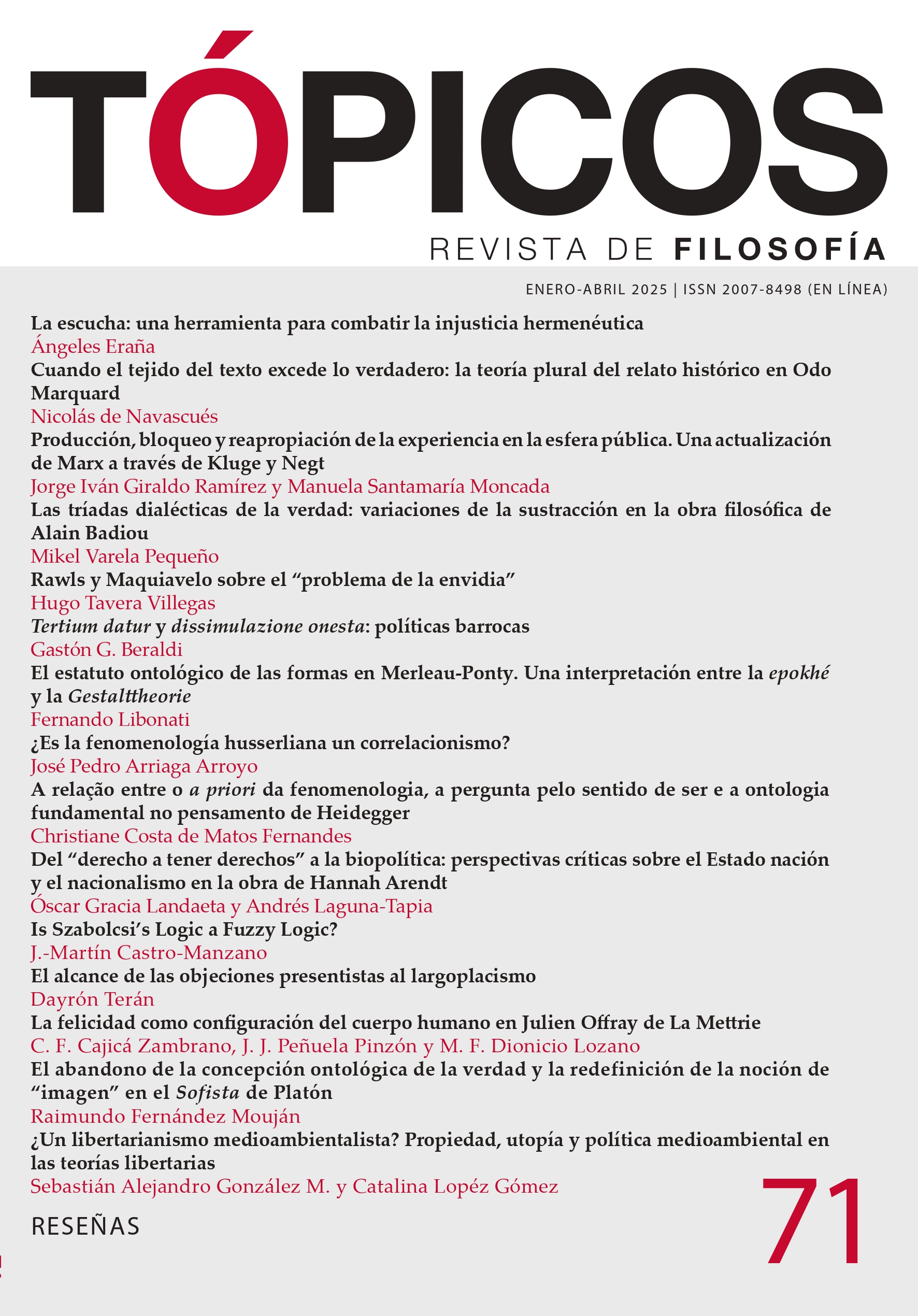Artículos
A relação entre o a priori da fenomenologia, a pergunta pelo sentido de ser e a ontologia fundamental no pensamento de Heidegger
Publicado 2024-12-16
Palabras clave
- fenomenología,
- ontología,
- a priori
Derechos de autor 2024 Tópicos, Revista de Filosofía

Esta obra está bajo una licencia internacional Creative Commons Atribución-NoComercial-SinDerivadas 4.0.
Cómo citar
Costa de Matos Fernandes, C. (2024). A relação entre o a priori da fenomenologia, a pergunta pelo sentido de ser e a ontologia fundamental no pensamento de Heidegger. Tópicos, Revista De Filosofía, 71, 289-311. https://doi.org/10.21555/top.v710.2808
Resumen
A proposta desse trabalho é relacionar momentos do percurso investigativo de Heidegger, durante os anos 1920, a fim de descrever o que parece ser uma relação decisiva a partir da qual toda a arquitetura de Ser e tempo pode ser compreendida enquanto projeto filosófico, a saber: o nexo entre aquilo que o autor indica como o verdadeiro a priori da fenomenologia, a pergunta pelo sentido de ser e, finalmente, a necessidade de uma ontologia fundamental.
Referencias
- Critchley, S. (2016). Sobre o Ser e Tempo de Heidegger. M. Sá Schuback (trad.). Editora Mauad.
- Crowell, G. S. (2001). Husserl, Heidegger, and the Space of Meaning: Paths Toward Transcendental Phenomenology Northwestern University Press.
- Dahlstrom, O. D. (1994). Heidegger’s Method: Philosophical Concepts as Formal Indications. The Review of Metaphysics, 47(4), 775-795.
- Heidegger, M. (1977). [GA 2]. Gesamtausgabe. I. Abteilung: Veröffentlichte Schriften 1910–1976. Band 2. Sein und Zeit. F.-W. von Herrmann (ed.). Vittorio Klostermann.
- Heidegger, M. (1992). [GA 19]. Gesamtausgabe. II. Abteilung: Vorlesungen 1919–1944. Band 19. Platon: Sophistes. I. Schüssler (ed.). Vittorio Klostermann.
- Heidegger, M. (1994a). [GA 20]. Gesamtausgabe. II. Abteilung: Vorlesungen 1919–1944. Band 20. Prolegomena zur Geschichte des Zeitbegriffs. P. Jaeger (ed.). Vittorio Klostermann.
- Heidegger, M. (1994b). [GA 61]. Gesamtausgabe. II. Abteilung: Vorlesungen 1919–1944. Band 61. Phänomenologische Interpretationen zu Aristoteles. Einführung in die phänomenologische Forschung. W. Bröcker e K. Bröcker-Oltmanns (eds.). Vittorio Klostermann.
- Heidegger, M. (1999). [GA 56/57]. Gesamtausgabe. II. Abteilung: Vorlesungen 1919–1944. Band 56/57. Zur Bestimmung der Philosophie. B. Heimbüchel (ed.). Vittorio Klostermann.
- Heidegger, M. (2006). Prolegómenos para una Historia del concepto de tiempo. J. Aspiunza (trad.) Alianza.
- Heidegger, M. (2011). Interpretações fenomenológicas sobre Aristóteles. Introdução à pesquisa fenomenológica. E. P. Giachini (trad.). Editora Vozes.
- Heidegger, M. (2012a). Platão: O sofista. M. A. Casanova (trad.). Forense Universitária.
- Heidegger, M. (2012b). Ser e Tempo. F. Castilho (trad.). Editora Unicamp-Editora Vozes.
- Husserl, E. (2016). A ideia da fenomenologia. A. Morão (trad.). Edições 70.
- Mohanty, J. N. (1985). The Possibility of Transcendental Philosophy. Martinus Nijhoff.
- Reis, R. R. (2001). Verdade e indicação formal: a hermenêutica dialógica do primeiro Heidegger. Veritas, 46(4), 607- 620.
- Rodríguez, R. (1997). La transformación hermenéutica de la fenomenología. Tecnos.
- Taminiaux, J. (1989). Lectures de l’ontologie fondamentale. Essais sur Heidegger. Jérôme Millon.





